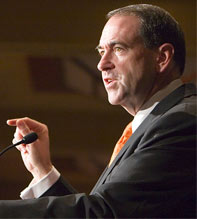Mar 6, 2008
 Tuesday evening, John McCain clinched the Republican nomination for president, and Mike Huckabee, the last remaining contender, conceded defeat. Huckabee's campaign, and the failure of the Religious Right to support him, has been one of the most interesting and puzzling stories of this primary season
Tuesday evening, John McCain clinched the Republican nomination for president, and Mike Huckabee, the last remaining contender, conceded defeat. Huckabee's campaign, and the failure of the Religious Right to support him, has been one of the most interesting and puzzling stories of this primary season
While Huckabee is certainly a social conservative, he refused to toe the line on a number [...]
Read the Full Article

Already a subscriber? Login